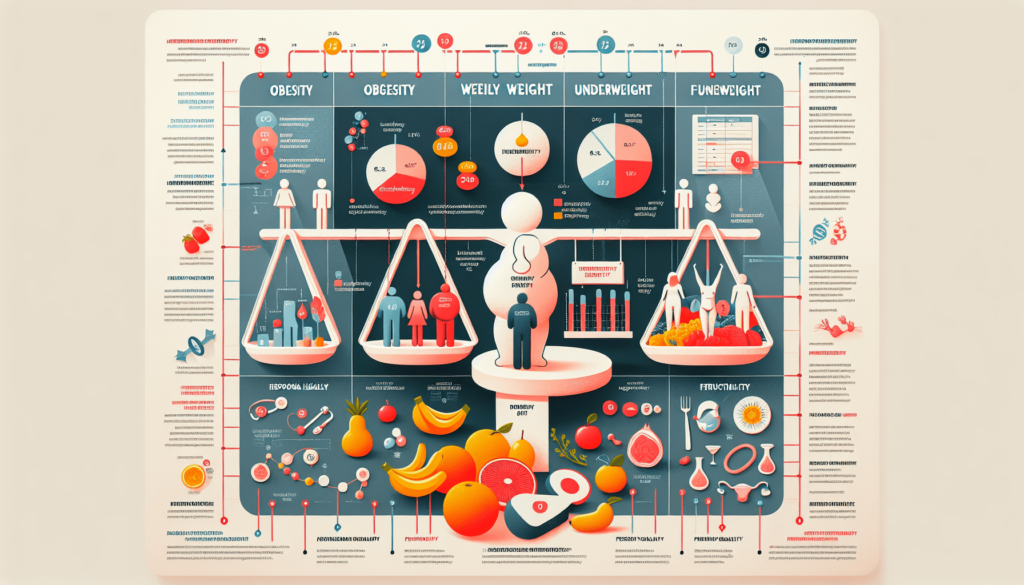Have you ever considered the connection between weight and fertility? It turns out, weight can play a significant role in both the chances of conceiving and the overall outcome of pregnancy. This article aims to shed light on the potential impact weight can have on fertility and the importance of maintaining a healthy weight for those who are trying to conceive. Whether you are on a weight loss journey or simply curious about the relationship between weight and fertility, this article will provide you with valuable insights and information. So, let’s explore this fascinating link and uncover the secrets that lie within.

This image is property of images.pexels.com.
In This Article
ToggleUnderstanding Weight and Fertility
When it comes to fertility and the ability to conceive, many factors come into play. One such factor that has gained significant attention in recent years is weight. Research has shown that weight can have a substantial impact on both female and male fertility, as well as the success rates of assisted reproductive technologies (ART). Understanding this relationship is crucial for individuals who are trying to conceive or considering fertility treatments. In this comprehensive article, we will explore the connection between weight and fertility, the effects of weight on reproductive hormones, and the impact of weight on both male and female fertility. We will also delve into the role of weight in assisted reproductive technologies and the importance of managing weight during pregnancy. Finally, we will discuss the impact of weight loss on fertility and provide key considerations and recommendations for individuals seeking to optimize their fertility through weight management. So sit back, relax, and let’s dive into the fascinating world of weight and fertility!
The Relationship Between Weight and Fertility
Weight plays a significant role in fertility, affecting both men and women. Body mass index (BMI), a measure of body fat based on height and weight, is commonly used to gauge weight status and its relation to fertility. It serves as an important tool for assessing the potential impact of weight on reproductive health.
Body Mass Index (BMI) and Fertility
BMI has been extensively studied to determine its impact on fertility. Research suggests that both low and high BMI can have negative repercussions on fertility outcomes. Generally, a BMI below 18.5 is classified as underweight, while a BMI above 24.9 is considered overweight. Individuals with a BMI over 30 are classified as obese. BMI serves as a useful starting point for understanding weight-related fertility issues, but it is important to remember that it does not account for variations in body composition or distribution of body fat, which can also affect fertility outcomes.
Impact of Weight on Reproductive Hormones
Weight has a direct influence on reproductive hormones, which are vital for the proper functioning of the reproductive system. In women, excess weight can disrupt hormone levels, leading to irregular menstrual cycles, ovulation problems, and reduced fertility. One of the key hormones affected by weight is insulin, which plays a crucial role in regulating blood sugar levels. Excess weight can cause resistance to insulin, leading to an imbalance of other reproductive hormones such as estrogen and progesterone.
In men, weight also affects hormone levels, particularly testosterone. Obesity is associated with decreased testosterone production and increased estrogen levels, which can impair sperm production and quality. Male reproductive hormones are instrumental in sperm production, maturation, and motility. Therefore, maintaining a healthy weight is important for optimizing male fertility.
Weight and Female Fertility
Weight can have distinct effects on female fertility, both when an individual is underweight or overweight. Both extremes can disrupt the delicate balance of hormones required for regular ovulation and successful conception.
Effects of Underweight on Female Fertility
Being underweight can have a detrimental impact on female fertility. Insufficient body fat can disrupt the normal functioning of reproductive hormones, leading to irregular menstrual cycles and ovulation problems. In some cases, underweight individuals may not ovulate at all, making it challenging to conceive naturally. Additionally, underweight women have a higher risk of miscarriage and pregnancy complications, highlighting the importance of achieving a healthy weight for fertility and overall reproductive health.
Effects of Overweight on Female Fertility
Just as being underweight can affect fertility, being overweight or obese can also significantly impact female reproductive health. Excess body fat has been linked to hormonal imbalances, insulin resistance, and increased production of inflammatory substances that can interfere with reproductive processes. As a result, women who are overweight or obese may experience irregular menstrual cycles, reduced ovulation, and increased difficulty in conceiving. The risk of complications during pregnancy, such as gestational diabetes and high blood pressure, is also higher in overweight or obese women.
Polycystic Ovary Syndrome (PCOS) and Weight
Polycystic ovary syndrome (PCOS) is a common hormonal disorder among women of reproductive age. It is characterized by high levels of androgens (male hormones), insulin resistance, and ovarian cysts. Weight plays a crucial role in the development and management of PCOS. In fact, approximately 50-60% of women with PCOS are overweight or obese. The excess weight exacerbates insulin resistance and hormonal imbalances, making it even more challenging for these women to conceive. However, even a modest weight loss of 5-10% can improve insulin sensitivity, restore hormonal balance, and increase the chances of ovulation and conception in women with PCOS.
Weight Loss and Improvement of Fertility
For women struggling with infertility due to weight-related issues, weight loss can be a game-changer. Losing excess weight can help restore hormonal balance, regulate menstrual cycles, and promote ovulation. It can also improve the chances of success with fertility treatments, such as in vitro fertilization (IVF) and intrauterine insemination (IUI). However, it is important to approach weight loss in a healthy and sustainable manner. Crash diets or extreme exercise regimes can have negative consequences on fertility and overall health. Seeking guidance from a healthcare professional, such as a fertility specialist or a registered dietitian, is highly recommended to develop a personalized weight loss plan that optimizes fertility outcomes.
Weight and Male Fertility
While much emphasis is often placed on the impact of weight on female fertility, it is essential to recognize that weight can also affect male fertility. Weight-related issues can have detrimental effects on sperm production, quality, and overall fertility potential.
Effects of Underweight on Male Fertility
Being underweight can negatively impact male fertility by affecting hormone levels and sperm production. Inadequate body fat can disrupt the delicate balance of reproductive hormones, impair testosterone production, and lead to a decrease in sperm count and quality. Additionally, underweight men may experience decreased libido and erectile dysfunction, further hindering their fertility potential.
Effects of Overweight on Male Fertility
Similar to women, excess weight in men can have adverse effects on fertility outcomes. Obesity is associated with decreased testosterone levels, increased estrogen levels, and decreased sperm quality and motility. The excess body fat can also lead to increased scrotal temperature, which can further impair sperm production and function. Overweight or obese men may experience difficulties in achieving and maintaining erections, reducing their chances of conceiving naturally.
Obesity-Related Factors Affecting Male Fertility
Obesity is linked to several factors that can directly impact male fertility. One of the key mechanisms behind this is the chronic inflammation caused by excess body fat. The inflammatory substances released by adipose tissue can damage sperm cells, impair sperm DNA integrity, and decrease overall sperm quality. Obesity is also associated with oxidative stress, a cellular imbalance between reactive oxygen species and antioxidants. This can further damage sperm cells and reduce their ability to fertilize an egg. Addressing these obesity-related factors through weight management can improve sperm parameters and enhance male fertility.
Weight Loss and Improvement of Fertility
Weight loss can significantly improve male fertility outcomes. Shedding excess weight can boost testosterone levels, decrease estrogen levels, and alleviate inflammation and oxidative stress. These improvements have been shown to increase sperm count, motility, and morphology, improving the chances of conception. However, it is important to note that substantial weight loss may take several months to have a noticeable impact on sperm quality. Additionally, adopting a healthy and balanced diet, engaging in regular physical activity, and managing stress can further enhance fertility potential.

This image is property of images.pexels.com.
Weight and Assisted Reproductive Technologies (ART)
For individuals or couples undergoing assisted reproductive technologies (ART), such as in vitro fertilization (IVF) or intrauterine insemination (IUI), weight plays a significant role in the success rates and overall outcomes of these treatments.
Effect of Weight on Success Rates of ART
Research has shown that weight can influence the success rates of ART. Both underweight and overweight individuals may have reduced chances of success with fertility treatments. Studies have indicated that underweight women have a higher risk of implantation failure and pregnancy loss, while overweight or obese women may experience lower fertilization rates, decreased embryo quality, and higher chances of pregnancy complications. Therefore, achieving a healthy weight before undergoing ART can improve the likelihood of a successful pregnancy.
Impact of Weight on Egg Quality and Maturation
Weight can affect egg quality and maturation, which are crucial for successful fertilization and embryo development. In women with a high BMI, there is an increased likelihood of poorer egg quality, lower fertilization rates, and lower implantation rates. Additionally, overweight or obese women may exhibit abnormal levels of certain hormones, such as anti-Müllerian hormone (AMH), which is a key indicator of ovarian reserve. These factors can reduce the efficacy of ART and limit the chances of a successful pregnancy.
Role of Weight in Ovarian Stimulation
Ovarian stimulation is an essential step in ART that involves the use of medications to stimulate the ovaries to produce multiple mature eggs. Weight can impact the response to ovarian stimulation, with overweight and obese women often requiring higher doses of fertility medications. This can increase the risk of ovarian hyperstimulation syndrome (OHSS), a condition characterized by enlarged ovaries and fluid accumulation in the abdomen. OHSS can be potentially serious and may require medical intervention, highlighting the need for weight management in individuals undergoing ovarian stimulation.
Relevant Considerations for Overweight and Obese Individuals Undergoing ART
If you are overweight or obese and considering ART, there are several relevant considerations to keep in mind. Firstly, achieving a healthy weight before starting fertility treatments can improve the chances of success and reduce the risk of complications. Additionally, certain aspects of the ART process may be more challenging for overweight or obese individuals, such as ultrasound imaging due to the presence of excess abdominal fat. Discussing these considerations with your healthcare team can help tailor the treatment plan to your unique needs and optimize the chances of a successful outcome.
Gestational Weight and Pregnancy Outcomes
Maintaining an appropriate weight during pregnancy is essential for the health and well-being of both the mother and baby. Excessive or inadequate gestational weight gain can increase the risk of complications and have long-term effects on the health of both individuals.
The Importance of Appropriate Gestational Weight
Appropriate gestational weight gain is crucial for ensuring a healthy pregnancy. The amount of weight a woman should gain during pregnancy depends on her pre-pregnancy BMI. The Institute of Medicine (IOM) provides guidelines for gestational weight gain based on BMI categories. Adhering to these guidelines can help reduce the risk of pregnancy complications and promote optimal fetal development.
Risks Associated with Excessive Gestational Weight Gain
Excessive gestational weight gain is associated with several risks and complications. These include an increased likelihood of gestational diabetes, preeclampsia (high blood pressure), cesarean delivery, and postpartum weight retention. Babies born to mothers who experience excessive weight gain during pregnancy are also at a higher risk of macrosomia (excessive birth weight), which can lead to delivery complications and an increased likelihood of obesity later in life.
Complications Related to Inadequate Gestational Weight Gain
Inadequate gestational weight gain can also have detrimental effects on pregnancy outcomes. Insufficient weight gain is associated with a higher risk of preterm birth, low birth weight, and intrauterine growth restriction (IUGR). Inadequate nutrient intake during pregnancy can compromise the baby’s development, potentially leading to long-term health consequences.
Managing Weight During Pregnancy
Maintaining a healthy weight during pregnancy requires a balanced approach. It is important to focus on proper nutrition, regular physical activity (as advised by your healthcare provider), and appropriate weight gain according to your BMI. Consulting a registered dietitian or a healthcare professional specializing in prenatal care can provide personalized guidance on nutrition and weight management during pregnancy. It is vital to remember that pregnancy is not a time for weight loss but rather for optimizing maternal and fetal health through healthy lifestyle choices.

This image is property of images.pexels.com.
Impact of Weight Loss on Fertility
Weight loss is often recommended as a strategy to improve fertility outcomes in individuals who are overweight or obese. Shedding excess weight can have significant positive effects on hormonal balance, insulin sensitivity, reproductive organ function, and overall fertility potential.
Weight Loss as a Strategy to Improve Fertility
Weight loss can be a powerful tool in optimizing fertility outcomes for both men and women. By addressing the underlying factors associated with excess weight, such as inflammation, hormonal imbalances, and insulin resistance, weight loss can restore reproductive hormone levels, promote regular ovulation and sperm production, and enhance pregnancy chances. It is important to note that even modest weight loss can have substantial benefits for fertility, and each individual’s journey towards a healthy weight may be unique.
Optimal Methods for Weight Loss
When embarking on a weight loss journey to improve fertility, it is crucial to choose sustainable and healthy methods. Crash diets or extreme exercise regimens can have adverse effects on fertility by disrupting hormonal balance and overall reproductive health. Instead, focusing on a well-rounded approach that includes a balanced diet, regular physical activity, stress management, and adequate sleep can yield the best results. Additionally, incorporating behavioral changes and adopting healthy habits for the long term can support weight maintenance and sustained fertility benefits.
Lifestyle Interventions and Fertility
Lifestyle interventions play a pivotal role in weight loss and fertility improvement. Engaging in regular physical activity, such as walking, jogging, or swimming, can aid in weight management while also improving cardiovascular health and overall well-being. Making healthier food choices, including consuming a variety of fruits, vegetables, whole grains, lean proteins, and healthy fats, can support weight loss efforts and optimize fertility outcomes. Additionally, managing stress levels through techniques like meditation, yoga, or counseling can reduce emotional and psychological barriers that may affect fertility.
Medical Interventions for Weight Loss and Fertility Improvement
In some cases, individuals may require additional support beyond lifestyle changes alone. Medical interventions for weight loss, such as medication or bariatric surgery, may be considered under the guidance of a healthcare professional. These interventions can be effective in jump-starting weight loss efforts, particularly for individuals with significant excess weight or obesity. It is important to discuss the potential risks, benefits, and long-term implications of these interventions with a healthcare provider to make an informed decision regarding the most suitable approach.
Considerations and Recommendations
When navigating the complex relationship between weight and fertility, there are certain considerations and recommendations that can support individuals in achieving their fertility goals while maintaining overall well-being.
Seeking Medical Advice and Guidance
Consulting with a healthcare professional specializing in fertility or reproductive medicine is crucial for personalized advice and guidance. These professionals can assess your individual health status, evaluate potential underlying factors affecting fertility, and develop a tailored treatment plan. They can also provide support and resources to assist in weight management efforts specifically aimed at improving fertility outcomes.
Achieving and Maintaining a Healthy Weight
Attaining and maintaining a healthy weight is a gradual process that requires commitment and patience. Setting realistic weight goals and focusing on sustainable lifestyle changes can optimize long-term success. It is important to remember that weight loss should not be pursued solely for fertility purposes but rather as part of a holistic approach to overall health and well-being.
Balancing Weight Management and Fertility Goals
While weight plays a significant role in fertility, it is essential to strike a balance between weight management efforts and the psychological and emotional aspects of fertility journeys. Fertility can be a sensitive topic, and the pressure to conceive may intensify when weight becomes a focus. Practicing self-care, seeking emotional support from loved ones or support groups, and engaging in stress-reducing activities can help navigate this challenging time and foster overall well-being.
Importance of a Holistic Approach
Taking a holistic approach to fertility and weight management is crucial for optimal results. This approach involves addressing underlying factors that may be contributing to weight issues and fertility challenges. It encompasses aspects such as nutrition, physical activity, stress management, sleep hygiene, and emotional health. By addressing these interconnected aspects of overall well-being, individuals can optimize their fertility potential and improve their chances of conception.

Conclusion
Understanding the link between weight and fertility is crucial for individuals who are trying to conceive or undergoing fertility treatments. Weight can have a significant impact on both female and male fertility, as well as the success rates of assisted reproductive technologies. From the effects of underweight and overweight on fertility outcomes to the role of weight management during pregnancy, weight plays a vital role in reproductive health. Additionally, weight loss has been shown to improve fertility outcomes for individuals struggling with weight-related infertility. It is important to approach weight management through healthy and sustainable methods, seeking guidance from healthcare professionals and adopting a holistic approach to overall well-being. By taking proactive steps towards a healthy weight and consulting with healthcare professionals, individuals can optimize their fertility potential and increase their chances of building the family they desire. Remember, every fertility journey is unique, and you are not alone. Seek the support and guidance you need, and remember to take care of yourself along the way.
Related posts:
 Understanding the Link Between Weight Loss and Eating Disorders
Understanding the Link Between Weight Loss and Eating Disorders
 Understanding the Relationship Between Weight and Self-Esteem
Understanding the Relationship Between Weight and Self-Esteem
 Menopause Relief Jewelry Set for Women: Lymphatic Drainage Bracelet, Arthritis Pain Bracelet, and Rhinestone Link Bracelet – Perfect Gifts for Mom and Friend
Menopause Relief Jewelry Set for Women: Lymphatic Drainage Bracelet, Arthritis Pain Bracelet, and Rhinestone Link Bracelet – Perfect Gifts for Mom and Friend
 Understanding the Impact of Diabetes on Pregnancy: Mother and Child Concerns
Understanding the Impact of Diabetes on Pregnancy: Mother and Child Concerns
 Understanding Diabetic Neuropathy: The Hidden Danger of Nerve Damage
Understanding Diabetic Neuropathy: The Hidden Danger of Nerve Damage
 Discovering a Long-Term Sustainable Weight Loss Plan
Discovering a Long-Term Sustainable Weight Loss Plan











No comment yet, add your voice below!